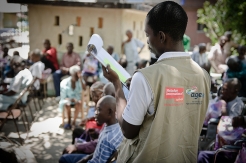
HelpAge’s health teams in Haiti are rapidly stepping-up services in camps where we work with older people.
This is a precautionary early-warning mechanism in response to the country’s cholera outbreak.
According to Haitian health authorities, at least 250 people have died and over 3,000 cases of cholera have been confirmed.
A coordinated approach
Roger Markowski, country director of HelpAge in Haiti says: “At this stage it is vital that we work with the Government of Haiti and the wider humanitarian community to guarantee a coordinated response to the situation. That way, we will ensure that the most vulnerable sections of the population are not left out of treatment and prevention.”
Working together with UN cluster groups, we are:
- coordinating the supply of chlorine tablets for household water purification
- monitoring for early detection of any cases of cholera, especially at camps and at our partners’ facilities
- contact-tracing with our home-based care and community agents
training nurses and camp volunteers in awareness and preventative measures.
Prevention and preparation
HelpAge is planning to use its pre-existing radio show “Koze Granmoun, Pawòl Timoun” (“Older people’s chat, children’s discussions”) on Radio Soleil (105.7 FM), to broadcast prevention messages to communities.
We are making sure all older people in each of the camps have appropriate hygiene materials. We are also assessing further essential needs for older people, such as provision of drinking water containers and access to safe drinking water.
We have started stock piling oral rehydration solutions and antibiotics for contact cases of cholera and have so far received enough from WHO to treat 4,000 individuals.
Ndaro Essaba, of HelpAge’s Haiti health team says: “This week we are training our 200 home-based carers and volunteers in the 93 camps we operate in. This is vital for us as it means that if cholera does reach the camps, we can act quickly to treat those older people affected.”
